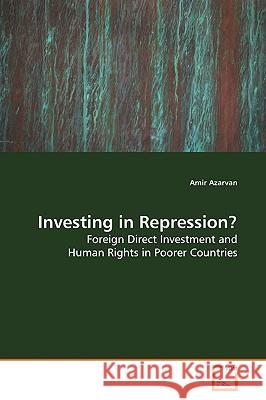Investing in Repression? » książka
Investing in Repression?
ISBN-13: 9783639148510 / Angielski / Miękka / 2009 / 196 str.
This book represents an important contribution to the debate on the impact of foreign direct investment on human rights in the Global South. Political scientist, Amir Azarvan, assesses - both quantitatively and qualitatively - the effects of FDI on socioeconomic well-being and physical integrity rights in host countries. Statistical analysis largely disconfirms the neoliberal theory that FDI reduces the repression of physical integrity rights over time. In contrast, there is stronger evidence for the historical structuralist theory that countries with large flows of FDI are more repressive in times of domestic unrest. Case study analysis largely supports these statistical findings and, in the case of Algeria, suggests ways to modify historical structuralism. These findings thus constitute a challenge to what appears to be an emerging neoliberal consensus in the literature, and imply the need to more closely regulate the activities of multinational corporations.
This book represents an important contribution to the debate on the impact of foreign direct investment on human rights in the Global South. Political scientist, Amir Azarvan, assesses - both quantitatively and qualitatively - the effects of FDI on socioeconomic well-being and physical integrity rights in host countries. Statistical analysis largely disconfirms the neoliberal theory that FDI reduces the repression of physical integrity rights over time. In contrast, there is stronger evidence for the historical structuralist theory that countries with large flows of FDI are more repressive in times of domestic unrest. Case study analysis largely supports these statistical findings and, in the case of Algeria, suggests ways to modify historical structuralism.These findings thus constitute a challenge to what appears to be an emerging neoliberal consensus in the literature,and imply the need to more closely regulate the activities of multinational corporations.











